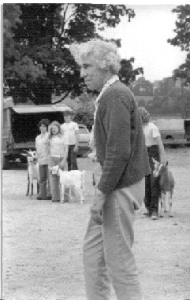Helen (Cummings) Hunt: Exemplary Dairy Goat Breeder
Helen Hunt remains, even after her death, one of the finest of examples for other breeders of dairy goats in America and especially so for all members of the American Dairy Goat Association. The ADGA Distinguished Service Award was re-established in her name in 1995 as the Helen C. Hunt Distinguished Service Award. No other member more deserved the honor of the naming of this award.

March 17. 1909 – September 23, 1995
Helen was born March 17. 1909, in Bedford Hills, N.Y., daughter of the late John C. and Bertha (Seccomb) Hunt. She attended Milton Academy, Radcliffe and Cornell, majoring in ornithology. Moving to Washington, CT, in 1932, she established Shagbark Farm and began her animal breeding experience with Cairn Terriers. Later, she began breeding her famous Shagbark Toggenburg dairy goats there also, and became a national figure in both fields. Most of her long life was spent at the farm, until age forced her retirement. She died at 86 on September 23, 1995.
The latch-string was always out at Shagbark; breeders learned that the price for stock was always as reasonable as the quality was high. And a trip to the beautiful little farm, nestled as it was in the Connecticut hills, was like a journey to Eden. Helen employed a full time herdsman, who lived with his family in a separate residence at the farm. The herd was small, but Helen was a very practical person and her milkers produced excellent, flavorful milk which the farm was licensed to sell raw. Although she was left somewhat crippled in one hand and leg by polio when she was a youngster, Helen participated in the milking (which they did by hand) and other chores around the farm. Obviously, all decisions, small to large, from breeding to husbandry to housing, were hers to make.
As a breeder, she always brought her considerable intelligence to bear and used the knowledge she had gained during many years of experience, in making breeding decisions. As a conservative breeder, she did not practice in – or exclusive line-breeding, but her open mind made it possible for her to accept all kinds of breeding done by others, even as it was possible for her to accept as friends and equals all kinds of people. Goat breeding was not a hobby for Helen; it was her life-blood. Her interest in breeding was always in making over-all better animals; in perusing her breeding history it is obvious that at no time did she ever emphasize one aspect of quality over another. Due to assiduous attention to what she knew to be superior quality, her goats continued to gain in strength right up until the time she retired. The breeders who used her stock as a foundation reaped benefits in various strengths; in fact, still continue to do so.
Helen’s relationship to her customers was a fine example of her distinguished service to the dairy goat world. No question ever went unanswered; her promptness was legendary; her patience unlimited. She offered a helping hand to all who needed it; no holds barred because of race, religion, financial or social status, or age. Her understanding of human nature and lack of competitiveness was truly wonderful. Having no children of her own, her mind and heart were always open to young people wherever she found them. But of all her fine social and business qualities, her candid, impeccable honesty, even to herself, was the most outstanding.
Another facet of Helen’s life which offers such a splendid example of merit is her support of the American Dairy Goat Association and all its programs. She never missed a convention; she was a long time, and very hard working, district director as well as a judge. How many valuable programs she instigated for ADGA no one individual can tell. Her Shagbark herd, although small in numbers, was consistently enrolled in all the ADGA Performance Programs: DHIA in all its aspects beginning in 1948; producing official ADGA show winners in 1947. Not only was her herd scored in the first year of Classification (original designation of what later became Linear Appraisal), Helen spent considerable amounts of time and money supporting Classification, not only in the founding committee, but traveling around the country advising breeders of its value to their breeding programs.
Helen Hunt’s was a lifetime of distinguished devotion to dairy goats in many ways, and to the American Dairy Goat Association, with its service to members, in particular.
By June York Meacham, Houyhnhnm Toggenburgs